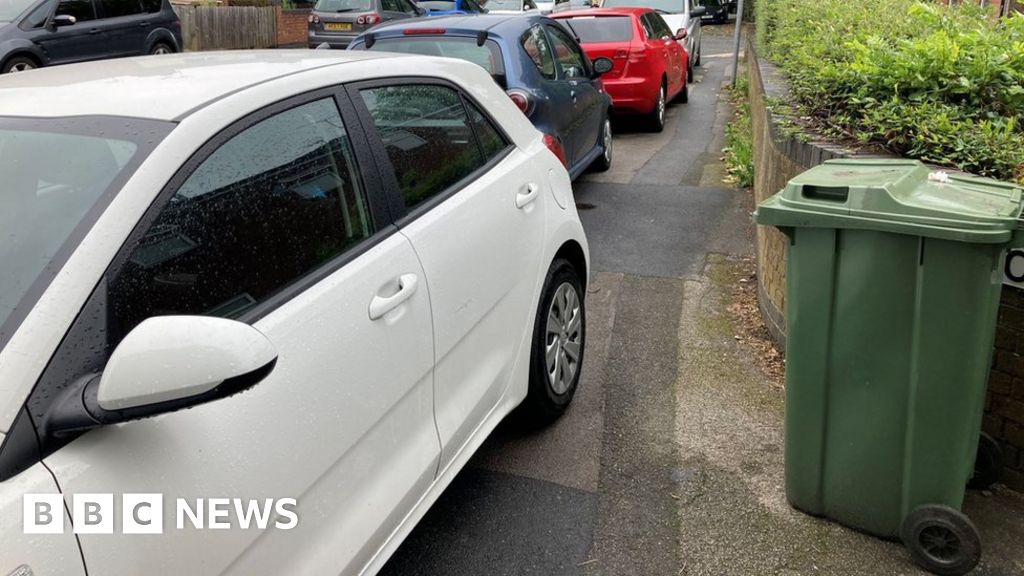Sounds great in principle, but where are me and the other 60 houses down our terraced street with no off-street parking supposed to park our cars?
Yes, I’d love to live in the public transport utopia that’s just over the horizon, but right now, I need a car to get to and from work and I live in a house that was literally built before cars were a thing.
Again, I can only speak to our street but the vast majority of car owners make sure there’s ample room to get through. The issue is that there’s usually one or two assholes who ruin it for everyone, and those guys usually find out pretty quickly why it’s a bad idea to block the path.
For context: I drive, but I’ve also had two kids and therefore two pushchairs I’ve had to navigate along the pavement. My car also got totalled a few years ago by a delivery driver who drove into it whilst it was parked. Id rather it not be parked on the road/pavement but what choice do we have here?
Found the guy from Manchester
Basically any city or town or village that was built before the invention of the car, and in the UK that’s basically everywhere. The house I live in was built before plumbing. God damn the road is narrow.
If we didn’t park on the curb no one would be able to get past. The other day an ambulance came up here, and it was a squeeze but it was fine so I don’t think it’s actually a problem.
deleted by creator
Basically true for Bristol too. Barely any rail network (despite having two main stations), a terrible bus system under a monopoly, and often no choice but to drive if you want to keep your job.
We’ve also got some very tight roads, and terraced housing that isn’t really fit for purpose any more, especially outside of the main city.
It’s your problem to find somewhere to park. Maybe on another nearby street. Or buy/rent a dwelling with parking provided.
“That’s your problem” is a terrible way to get people to support policy. These are real, valid concerns that many people simply can’t deal with without other systems in place that currently don’t exist.
This type of “fuck any gradual change, revolution now” is just armchair anarchy pushed by kids who don’t face financial pressure.
British streets were never built for the amount of cars we have today. I can see why parking half on/off is needed.
I live in a new estate where homes either have two spaces on their driveway or a parking space. People still park fully on the path. To the point if you was in a wheelchair you couldn’t get by. People also don’t use their allocated parking space and park outside their house on the footpath.
This. My ex has a separate garage with hardstanding in front of it 25m from her front door. The garage is full of shite and she parks in ‘her space’ outside her front door. She gets the arseache if someone else parks there as well.
Thing is, there is a Tesco Express at the end of the road and delivery lorries have taken her driver side wing mirror about three times.
Still has to park in her space though.
Oh totally. I don’t have a car because I don’t have anywhere to park it, and can’t justify owning a personal vehicle when (bad) public transport and cycle paths are available.
Because of this I find people who expect public space to be given to them, to the detriment of other people, to be selfish.
Ya but your argument is also expecting public space to be given to you to the detriment of others. It’s a double edged sword.
“Park on a different street” literally just shifts the problem.
If a public parking lot was available then ya, totally feasible, but it’ll have to be big which then takes up the land from something else, again shifting the problem.
You’re getting upitty with someone who is concerned that knee-jerk public policy is going to have large, likely unplanned, detrimental effects on the citizens outside of just themselves.
“Park on a different street” literally just shifts the problem.
Actually I’m more going for “don’t have a car if you don’t have anywhere to put it”. I know it’s an unpopular opinion, but having a car is not a right and the sheer volume of them is to the detriment of the entire population.
Taking space used for cars and giving it to cyclist does actually make everyone’s life better, even drivers. You get less pollution, traffic, medical cost to the NHS, pedestrian deaths, and infrastructure costs.
So if I park on another street aren’t I just parking in someone else’s way? You’re just kicking the can down the road you’re not actually fixing the problem the fact that you don’t get that is insane
Forcing people to park further away discourages them from purchasing a vehicle in the first place. Fewer cars is better for everyone.
No it doesn’t it just annoys them. Have you actually met people like real members of the human race or they all just abstract numbers in your head because you know nothing about humans.
I think it already is. It just doesn’t get enforced.
I think it is illegal to completely obstruct a pavement to the point that wheelchairs, pushchairs etc can’t get past.
But parking your car and leaving a bit of a gap is apparently fine.
When I had driving lessons, it was taught that most people think that’s the rule, and in real life it practically is the rule, but it’s on the books as illegal to put your car on the pavement at all, and you’ll be penalised for it during the parking parts of a driving test.
I know you’re not allowed to put an HGV on the pavement, but I thought everything else was ok.
From the highway code:
244
You MUST NOT park partially or wholly on the pavement in London, and should not do so elsewhere unless signs permit it. Parking on the pavement can obstruct and seriously inconvenience pedestrians, people in wheelchairs or with visual impairments and people with prams or pushchairs.
Law GL(GP)A sect 15
Signs explicitly permitting it are rare.
Law GL(GP)A is the Greater London (General Powers) Act, it has no bearing on what happens outside of London. “Should” instructions in the Highway Code are guidance for best practice and are not enforceable in and of themselves.
Except in London boroughs
Because rich cunts see the fine as the parking fee…
deleted by creator
We have the same issue in Germany. :( Car drivers just get away with absolutely everything unfortunately.
It’s not the rule.
So what happens is this, someone says you’re allowed to park on the pavement as long as you don’t obstruct the road, then someone else says no and quotes the highway code. Then you point out that the only thing you’re not allowed to do is park on the payment in London, and elsewhere you should basically not do it if you can avoid it.
No one is going to get arrested for parking partially on the pavement outside of London unless you’ve been a complete dick about it, or if it’s unnecessary. For where it’s necessary as long as there’s no other parking restrictions then you should be fine as long as pedestrians can get past.
The highway code is fine in principle, but the people who wrote it have never been further north than Bedford.
If only there was some kind of book or document that contains all the rules and instructions about the use of roads, that everyone can access freely and is constantly updated.
Rule 244
You MUST NOT park partially or wholly on the pavement in London, and should not do so elsewhere unless signs permit it. Parking on the pavement can obstruct and seriously inconvenience pedestrians, people in wheelchairs or with visual impairments and people with prams or pushchairs.
Seems pretty clear to me…
Should not means you can. You’re just a very naughty boy.
Ha, it gives that impression doesn’t it? But no, in this context that isn’t what should means. It’s like an also that extends the Must Not to the additional scenario, in this case outside of London.
It’s true that a lot of these things aren’t enforced, and if they are it’s not consistent. The thing is, the law is there and it can be enforced. If you are caught breaking it, well, that’s no-one else’s fault.
The law is NOT there for “should” statements in the Highway Code. “Shoulds” are considered best practice, and can work against you in a careless/dangerous driving case if you didn’t follow them, but they are not themselves tied to any specific legislation. “Must” statements ARE backed up by legislation, and so can be enforced.
The highway code is not law.
Yes, best practice. There’s a lot of talk here about the law, which I never mentioned.
You don’t get a criminal record when you receive a fine for a parking offence.
deleted by creator
You also can’t get fined if you don’t break a law.
If that were true, the text could read “ You MUST NOT park partially or wholly on the pavement unless signs permit it. “
Definitely it should do, or something more clearly worded at least.
I think it’s because of the distinction between London and elsewhere, which is also bollox. So it goes.
Interesting that it mentions London specifically. How do they cope? There are loads of terraced streets. Do they pay for nearby parking lots or is it just that they, unlike everywhere else, kept their public transport network
So if, as a council, we want to ban pavement parking around a bunch of terraces… or even just seriously restrict it, like to one side, can we make sure that there are cycle paths and bus routes then ban it and work stepwise across the town? ‘asking for a friend (Cheltenham)’
Nope : rules in the Code which are legal requirements, and which you will be committing a criminal offense if you disobey, use the words “must/must not.” Violating other parts of the Code, which use the words “should/should not” or “do/do not”, can be used as evidence against you in Traffic Court, even if violating them is not an automatic criminal offense
I’m not sure which bit of my comment you are noping?
Do you have something to back that up? It seems very odd that London would be named specially as must not then a second clause for the remainder of the country that sounds different. Surely it should either be “you must not park on the pavement” or if there’s some archaic reason that London needs specific wording "you must not park on the pavement in London, and you must not park on the pavement elsewhere "
The Highway Code?
No it doesn’t seem to be in there. According to the highway code
Many of the rules in the Code are legal requirements, and if you disobey these rules you are committing a criminal offence. You may be fined, given penalty points on your licence or be disqualified from driving. In the most serious cases you may be sent to prison. Such rules are identified by the use of the words ‘MUST/MUST NOT’. In addition, the rule includes an abbreviated reference to the legislation which creates the offence. See an explanation of the abbreviations.
Although failure to comply with the other rules of the Code will not, in itself, cause a person to be prosecuted, The Highway Code may be used in evidence in any court proceedings under the Traffic Acts (see The road user and the law) to establish liability. This includes rules which use advisory wording such as ‘should/should not’ or ‘do/do not’.
No where does it say if an area is named specially as a must not, and another area is named as a should not in the same rule then the should not must be treated as a must not.
Or is there some case law maybe that you’re referring to?
It’s how I read it.
Because it starts out using must and cites London, it doesn’t make sense to then add elsewhere and use must again.And now I’ve read your quote and written out the above, I’ve definitely misread the rule.
And I know why. Other replies to my comment alluded to it but it’s only now I understand. I didn’t begin with the term must as being anything to do with criminal prosecution.
To me, it says you can’t park on a pavement in London or when signposted else where, and you can be given a fine for doing so.
I don’t see how receiving a fine makes you a criminal so I didn’t consider it in those terms.
My mistake, but it’s poorly worded. For example -
Rule 130
Areas of white diagonal stripes or chevrons painted on the road. These are to separate traffic lanes or to protect traffic turning right.
If the area is bordered by a broken white line, you should not enter the area unless it is necessary and you can see that it is safe to do so.
If the area is marked with chevrons and bordered by solid white lines you MUST NOT enter it except in an emergency.
That’s a much more clear distinction. But I don’t see anyone being made a criminal for the second part. It doesn’t describe an act that would have you arrested and prosecuted with the threat of prison.
I’ll be taking this up with them and I’ll use all these examples to see if we can get them to make the wording less confusing.
Because if I have to drive around constantly worried that I could go to prison for crossing a line, I’ll give up driving, sell my car and retire early. Fuck that.
Part of the problem is how much wider on average cars have got, making it less viable to park next to the curb or with just 2 wheels on it. Another part is that both members of a couple are more likely to be working and needing separate cars, and if their kids can’t afford to move away, than that’s an extra car too. Additionally, councils have convinced themselves that not lowering carbs to allow for extra driveways is promoting public transport use, ignoring how unviable that often is.
Cars with all 4 wheels on the pavement annoy me, but it’s become so normalised that drivers have looked at me, like me walking on the pavement is an irritating obstruction to where they have every right to be. I think the police in some areas allow you to upload a photo to report them, but it’s not something I’d do 'cos it’s a complex problem and fines aren’t the solution.
Said councils need to provide adequate parking, and ensure that future developments have such.
Councils need to provide public transport, and support walking and cycling
Sure, and the government needs to regulate the public transport industry such that they stop structuring their businesses so they can squirrel their profits away using Hollywood-style accounting. But, failing that, councils need to plan cities appropriately.
Even London, which has decent public transport, has decent space for parking.
So you want the city to freely give public space for your private vehicle?
Yes, Because I am entitled. So there. Peasant.
Why do city governments need to provide free/subsidized storage for private vehicles in public spaces, now?
It is not financially nor geometrically sustainable. It is a wealth transfer from the poorer to the richer. People who want cars can store them on their own property.
Private vehicles are owned by members of the public. The public pay taxes.
It not being “geometrically sustainable” is the result of poor planning - which the city council is responsible for.
Everything is owned by members of the public. That is not a clever argument.
There’s no reason to be subsidizing this. It is not necessary nor helpful for the health of the city.
Not being geometrically sustainable means that a city with good planning doesn’t lean into it. It’s not the “result of poor planning”. You can’t change the laws of geometry with planning. Cars are an inefficient and ineffective transportation plan outside of the countryside and cities should only support them the bare minimum necessary while encouraging other forms as primary - subsidizing them by providing free/mandatory parking is leaps and bounds beyond the bare minimum and can quickly put to death sustainable urban growth.
When in the midst of a housing crisis we should not be devoting city resources to these intensely inefficient, regressive uses.
deleted by creator
Because the private vehicles are owned by members of the public, and the public pay tax to the government. They’re also obligated to plan cities appropriately, rather than blame the problems on mistakes of past governments.
HMU on telegram @pounddc1 if you got verified idme let hit $300k upwards then we split 50/50














